Adaptogens Like Rhodiola Rosea for Emotional Strength and Independence
Introduction
Emotional strength and independence aren’t about shutting down your feelings—they’re about being able to stand steady in your emotions without being swept away by them. It’s the capacity to stay centered when life gets unpredictable and relationships feel uncertain. For people healing from co-dependency, anxiety, or emotional exhaustion, this balance can feel almost impossible.
When stress takes over, your body and mind fall out of sync. You might feel overattached, easily overwhelmed, or chronically fatigued. But there’s an ancient class of herbs that can help you regain resilience from the inside out—adaptogens.
Adaptogens are natural substances that help the body adapt to stress, balance hormones, and restore equilibrium. One of the most remarkable among them is Rhodiola Rosea, often called “the golden root.” This herb has been used for centuries in traditional medicine to build physical stamina and mental endurance, but modern science shows that it’s also a powerful ally for emotional resilience and nervous system regulation.
In this deep-dive article, we’ll explore how Rhodiola and other adaptogens support emotional independence by stabilizing your stress response, balancing brain chemistry, and building the physiological foundation for calm confidence. 🌸
Looking for supplements for This? Click here.
Understanding Emotional Independence 🌙
Emotional independence isn’t about detachment—it’s about inner stability. It means being able to handle external chaos without losing your internal peace.
When you’re emotionally dependent or co-dependent, your nervous system is wired to seek safety outside yourself. Someone’s tone, attention, or distance can dictate your entire mood. Your body reads emotional disconnection as danger, triggering cortisol, adrenaline, and anxiety.
Over time, this constant stress drains the adrenal glands—the body’s energy regulators—and leaves you feeling anxious, fatigued, or numb. You might find yourself over-giving, overthinking, or people-pleasing just to feel stable again.
Adaptogens help by rebuilding this physiological balance. They don’t sedate or stimulate—you could think of them as nature’s equalizers, helping your body respond to stress with flexibility instead of collapse.
What Are Adaptogens? 🌿

The term “adaptogen” was first coined in the mid-20th century to describe natural substances that:
✨ help the body adapt to physical and emotional stress
✨ restore balance to hormones and neurotransmitters
✨ enhance endurance and resilience without overstimulation
Adaptogens work at the level of the hypothalamic-pituitary-adrenal (HPA) axis, the system that controls your stress hormones. They modulate the release of cortisol and adrenaline, preventing your body from overreacting to emotional triggers.
Instead of keeping you in fight-or-flight mode, they help your system find a state of balance—called homeostasis—so you can recover faster from stress and maintain steady energy.
The result? Emotional stability that feels natural, not forced. 🌿
Meet Rhodiola Rosea: The Golden Root of Resilience 🌸
Rhodiola Rosea grows in cold, mountainous regions of Europe and Asia. It was historically used by Viking warriors to boost stamina and by Siberian communities to withstand harsh winters.
Modern research shows that Rhodiola helps regulate stress hormones, enhance brain function, and improve mood—all key factors in emotional strength and independence.
Rhodiola contains bioactive compounds called rosavins and salidroside, which:
💫 lower excessive cortisol levels (the stress hormone)
💫 increase dopamine and serotonin activity
💫 improve mental focus and reduce fatigue
💫 enhance cellular energy (ATP production)
By balancing your stress response, Rhodiola helps you stay calm under pressure—whether it’s emotional confrontation, work overload, or inner turmoil.
The Stress Response and Emotional Overdependence ⚡
When you rely on others for emotional regulation, your body is often in a state of hyperarousal. The brain’s amygdala signals danger every time connection feels uncertain. This triggers the adrenal glands to pump out cortisol and adrenaline, keeping you alert and anxious.
Over time, this cycle burns out your nervous system. You might feel:
💭 mentally scattered or foggy
💤 exhausted but unable to rest
💔 emotionally fragile or reactive
🌙 dependent on others to soothe your anxiety
Rhodiola helps interrupt this cycle by improving stress adaptability—your ability to return to calm after activation. It doesn’t suppress your emotions; it teaches your body how to handle them without collapsing.
That’s the essence of emotional independence: a calm nervous system that doesn’t need external validation to feel safe. 🌿
How Rhodiola Works in the Brain 🧠
Rhodiola influences several key neurotransmitters that govern mood, motivation, and stress resilience:
✨ Serotonin – stabilizes mood and helps regulate anxiety
✨ Dopamine – increases focus, drive, and self-confidence
✨ Norepinephrine – enhances alertness without overstimulation
It also modulates the monoamine oxidase (MAO) enzymes, which break down these neurotransmitters. By gently inhibiting MAO activity, Rhodiola allows serotonin and dopamine to stay active longer, enhancing overall mood stability.
In short: Rhodiola strengthens the biochemical foundation of emotional balance. When your neurotransmitters are regulated, you’re less likely to spiral into emotional reactivity or burnout.
The Cortisol Connection: Calming Emotional Overload 🌾
Cortisol plays a dual role—it helps you respond to stress, but when levels stay high, it fuels anxiety, insomnia, and fatigue.
Rhodiola helps normalize cortisol rhythm. In times of acute stress, it prevents cortisol from skyrocketing. In states of burnout, it helps restore depleted adrenal function.
This balancing act allows you to recover faster from emotional strain. Instead of feeling stuck in “survival mode,” you start to feel steady, alert, and emotionally clear.
Beyond Rhodiola: Other Adaptogens for Emotional Balance 🌺
While Rhodiola is one of the most energizing adaptogens, others complement it beautifully—each with its own unique benefits.
🌿 Ashwagandha: The ultimate cortisol-lowering adaptogen. It calms the mind, supports sleep, and rebuilds adrenal strength. Perfect for those who feel anxious or wired.
🍄 Reishi Mushroom: A gentle adaptogen that soothes the nervous system, enhances immunity, and promotes deep relaxation.
🌸 Holy Basil (Tulsi): Balances mood, reduces anxiety, and promotes mental clarity. Often called the “Queen of Herbs” for emotional peace.
🌱 Schisandra Berry: Boosts focus and motivation while protecting against fatigue and irritability.
Used together, these adaptogens create a symphony of stress resilience—energizing the body, centering the mind, and softening emotional overdependence.
Looking for supplements for This? Click here.
Adaptogens and the Nervous System 🌬️
Adaptogens don’t just affect hormones—they also help regulate the autonomic nervous system (ANS), which governs your stress and relaxation responses.
In emotional dependence, the sympathetic branch (“fight-or-flight”) dominates. The parasympathetic (“rest-and-digest”) rarely gets activated. Adaptogens encourage balance between the two, allowing your body to recover faster and stay centered under pressure.
That’s why people who take adaptogens like Rhodiola often report:
🌙 feeling more energized yet calm
💭 clearer thinking under stress
💗 less emotional reactivity
🧘 faster recovery from conflict or fatigue
These shifts are subtle but profound—they create the biochemical conditions for emotional maturity and independence.
From Emotional Reactivity to Emotional Resilience 🌿
Emotional resilience means you can experience strong emotions without losing balance. It’s the ability to feel anger, sadness, or fear and still respond thoughtfully.
Rhodiola supports this by improving the brain’s neuroplasticity—its capacity to adapt and rewire in response to stress. When your brain is more adaptable, you can break old emotional patterns and develop new ones.
For example:
💬 You can handle criticism without collapsing.
💬 You can tolerate silence without panicking.
💬 You can feel empathy without overidentifying.
Over time, your emotional “muscles” strengthen. You stop reacting impulsively and start responding intentionally.
The Emotional Grounding Effect 🌸
One of Rhodiola’s most unique traits is its dual action: it both energizes and grounds. Unlike caffeine or stimulants, which can cause jitteriness, Rhodiola promotes a smooth, stable alertness.
This balance helps you stay emotionally present and productive without the crash. It’s especially helpful if you’ve spent years swinging between burnout and overdrive—a pattern common in people who overextend themselves emotionally.
With Rhodiola, you start to find consistency: steadier moods, steadier energy, and steadier boundaries. 🌿
How to Take Rhodiola Safely 🌞
Rhodiola is typically taken in extract or capsule form. The most studied extracts contain 3% rosavins and 1% salidroside.
A typical daily dose is 200–400 mg once or twice a day, ideally taken in the morning or early afternoon to avoid interfering with sleep.
Because Rhodiola increases energy and focus, it pairs beautifully with calming adaptogens like Ashwagandha or Reishi for balanced support.
Always start with a lower dose and build gradually. And if you’re on antidepressants or thyroid medication, consult your healthcare provider, as Rhodiola can influence neurotransmitter and hormone balance.
Nutrition Synergy: What Pairs Well with Rhodiola 🌿🥑
Adaptogens work best when your body has the nutritional foundation to support recovery. Try combining them with:
✨ Omega-3 fatty acids – nourish brain cells and regulate mood
✨ Magnesium – relaxes the nervous system and improves sleep
✨ B-complex vitamins – support adrenal function and neurotransmitter production
✨ Probiotics – enhance gut-brain communication for emotional stability
Together, these nutrients create a biochemical environment that fosters calm, focus, and emotional integrity.
The Mind-Body Connection: Breath, Boundaries, and Balance 🌬️
Adaptogens can calm the body—but the mind also needs new patterns to sustain that calm. Try pairing your Rhodiola or adaptogen routine with daily nervous-system grounding practices:
🌿 Breathwork: Slow, rhythmic breathing activates the vagus nerve, enhancing parasympathetic balance.
Want to try Breathwork? Click Here.
🧘 Meditation or yoga: Build body awareness so you can catch emotional tension before it spirals.
🌸 Journaling: Reflect on triggers and reframe emotional stories from self-blame to self-understanding.
💬 Therapeutic boundaries: Practice small, consistent “no’s” that teach your nervous system safety through assertiveness.
Looking for online therapy ? Click Here.
Each practice strengthens your internal sense of safety—the key ingredient for emotional independence.
The Subtle Power of Adaptogens 🌙
Adaptogens don’t work like medication. Their magic is gradual and cumulative. You might not feel an instant change, but over weeks, you begin to notice:
💭 You recover faster from emotional stress.
💗 Your energy feels smoother, not spiky.
🧘 You’re calmer in situations that used to trigger panic.
🌿 You stop relying on others to calm your anxiety.
That’s because adaptogens don’t force the body—they teach it. They remind your nervous system how to regulate itself.
This is what emotional independence looks like on a cellular level: a body that knows peace without needing to chase it.
Building Emotional Strength from the Inside Out 🌄
Emotional strength isn’t about never feeling pain—it’s about staying steady through it. Rhodiola Rosea and other adaptogens help rebuild this strength biologically by stabilizing your stress response, restoring your energy, and improving mood balance.
As your body learns resilience, your mind follows. You stop reacting to every external change. You start trusting yourself to handle discomfort. And you realize that peace isn’t something others give you—it’s something you cultivate.
Adaptogens are not just herbs—they’re teachers. They remind you that balance is your natural state and that independence doesn’t mean isolation—it means returning home to yourself. 🌿💫
Looking for online therapy ? Click Here.
References 📚
Panossian, A., & Wikman, G. (2010). Effects of adaptogens on the central nervous system and the molecular mechanisms associated with their stress-protective activity. Pharmaceuticals.
Darbinyan, V., et al. (2000). Rhodiola Rosea in stress-induced fatigue—a double-blind crossover study of a standardized extract SHR-5 versus placebo. Phytomedicine.
Kelly, G. S. (2001). Rhodiola rosea: A possible plant adaptogen. Alternative Medicine Review.
Kennedy, D. O. (2016). Cognitive function, brain energy, and nutritional influences. Nutrition Reviews.
Sapolsky, R. M. (2004). Why Zebras Don’t Get Ulcers. Henry Holt & Company.
Related Posts
-
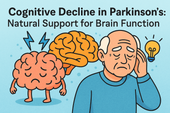
Cognitive Decline in Parkinson’s: Natural Support for Brain Function
Cognitive decline in Parkinson’s can affect memory, focus, and daily independence—but there’s hope. Understanding how the disease impacts brain chemistry opens the door to natural ways of support. From omega-3s and CoQ10 to mindfulness and exercise, you can nourish your brain, boost clarity, and slow decline through holistic care. 🌿🧠
-
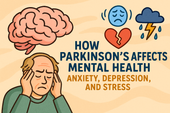
How Parkinson’s Affects Mental Health: Anxiety, Depression, and Stress
Dopamine is the brain’s spark of motivation—the chemical that fuels focus, pleasure, and drive. When dopamine levels are balanced, you feel inspired and alive; when they’re low, everything feels like an uphill climb. Understanding how dopamine works can help you support mental clarity, resilience, and emotional balance naturally. ⚡🧠
-
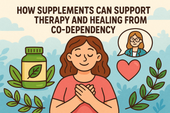
How Supplements Can Support Therapy and Healing from Co-Dependency
Biology is the science of life—an exploration of how cells, systems, and molecules create the foundation for every thought, emotion, and heartbeat. From the way our DNA shapes us to how hormones and neurons communicate, biology reveals the deep interconnectedness between mind and body. Understanding it helps us appreciate the delicate balance that keeps us alive, aware, and evolving. 🌿🧬
-
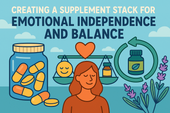
Creating a Supplement Stack for Emotional Independence and Balance
Biochemistry is the invisible language of life—how molecules, cells, and systems communicate to keep your body and mind in balance. From neurotransmitters shaping emotions to enzymes fueling energy, every process in your body reflects biochemical harmony. Understanding these reactions helps you see how nutrition, supplements, and emotions intertwine to support health, mood, and resilience. ⚗️🌿
-
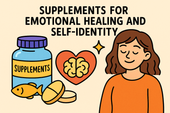
Supplements for Supporting Emotional Healing and Self-Identity
Biology is the bridge between mind and body—the science that explains how cells, hormones, and systems communicate to sustain life. It reveals how emotional states influence physical health, and how nourishment, rest, and movement keep us in balance. Understanding biology helps us reconnect with our natural intelligence and live in harmony with ourselves and the world. 🌿🔬
-
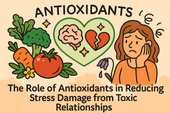
The Role of Antioxidants in Reducing Stress Damage from Toxic Relationships
Biology is the study of life in motion—the intricate dance between cells, systems, and the natural world. From DNA replication to neurotransmitter flow, every process in the human body reflects the intelligence of life adapting and evolving. Understanding this harmony helps us appreciate how nutrition, stress, and environment shape our health and emotional balance. 🌿🔬
-
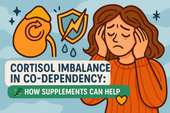
Cortisol Imbalance in Co-Dependency: How Supplements Can Help
Cortisol is the body’s main stress hormone—essential for energy and focus, yet harmful when chronically elevated. When life feels like constant pressure, cortisol imbalance can trigger fatigue, anxiety, and mood swings. Learning how to restore balance through rest, nutrition, and the right supplements can help you rebuild calm, clarity, and resilience from the inside out. 🌿💫
-
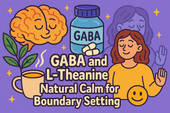
GABA and L-Theanine: Natural Calm for Boundary Setting
Anxiety can feel like a storm inside your mind—constant tension, overthinking, and the inability to relax even when you’re safe. But beneath the chaos, your body is simply trying to protect you. Learning to calm anxiety starts with understanding how your brain and nervous system respond to stress—and how to gently guide them back to peace. 🌿💫
-
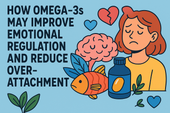
How Omega-3s May Improve Emotional Regulation and Reduce Over-Attachment
Inflammation isn’t just about sore joints or fatigue—it’s also a hidden driver of mood swings, anxiety, and emotional burnout. When chronic stress or poor diet keep the body inflamed, the brain’s chemistry changes, making calm harder to access. Learning how to reduce inflammation through nutrition, rest, and mindful living helps restore balance from the inside out. 🌿💫
-
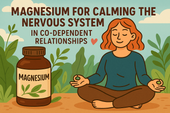
Magnesium for Calming the Nervous System in Co-Dependent Relationships
The nervous system is the body’s communication network, linking your mind and organs through a delicate web of electrical signals. It controls everything from emotional responses to muscle movement—and when it’s overwhelmed by chronic stress or anxiety, balance is lost. Learning how to calm and nourish your nervous system through nutrition, mindfulness, and rest can restore peace and emotional stability. 🌿💫
-
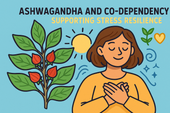
Ashwagandha and Co-Dependency: Supporting Stress Resilience
Stress is more than a feeling—it’s a full-body signal that your system is overwhelmed. When the mind races and the body tenses, your hormones, breathing, and focus all shift into survival mode. Chronic stress doesn’t just affect emotions—it reshapes your nervous system, drains your energy, and clouds your clarity. Learning to understand and manage stress gently is the first step toward peace, balance, and true recovery. 🌿💫
-

Why Co-Dependency Feels Draining: Adrenal Fatigue and Supplements That Help
The adrenal glands are small but powerful organs that sit above your kidneys, acting as your body’s built-in stress managers. They produce hormones like cortisol and adrenaline that help regulate energy, mood, and resilience. When they’re overworked from chronic stress or emotional exhaustion, fatigue and imbalance follow. Supporting adrenal health naturally can help restore calm, energy, and hormonal balance. 🌿⚡
-

The Link Between Anxiety, Co-Dependency, and Natural Support
Anxiety feels like living in constant alert mode—your heart races, your thoughts loop, and your body can’t find peace. It’s the nervous system’s way of preparing for danger, even when none exists. Understanding what’s happening in your mind and body is the first step toward calming the storm and restoring balance. 🌿💫
-

Supplements That Support Dopamine and Serotonin in Co-Dependent Patterns
Serotonin is the neurotransmitter of calm, confidence, and contentment. When it’s balanced, you feel peaceful and emotionally grounded. When it’s low, anxiety, mood swings, and emotional dependence take over. By understanding serotonin’s role in emotional health—and how to support it naturally—you can rebuild inner stability, improve relationships, and cultivate lasting happiness from within. 🌞💫
-

How Emotional Exhaustion in Codependency Impacts the Nervous System
The nervous system is the body’s communication network, connecting the brain to every organ and muscle. It regulates stress, mood, and emotion through a delicate balance of electrical and chemical signals. When overwhelmed, it can become dysregulated—leading to fatigue, anxiety, and emotional imbalance. Understanding how to calm and strengthen the nervous system is key to healing from chronic stress and emotional burnout. ⚡🌿
-

What Is Co-Dependency? The Role of Brain Chemistry and Stress
Stress is more than a feeling—it’s a full-body experience that begins in the brain and ripples through every cell. When cortisol surges and the nervous system stays on alert, your body can’t rest or recover. Over time, this constant tension affects energy, focus, mood, and even immune health. Understanding stress chemistry is the first step toward breaking free from burnout and finding calm again. 🌿
-

Creating a Supplement Stack for Motivation, Energy, and Anti-Procrastination
Motivation is the fuel behind every meaningful achievement—but it’s not just about willpower. It’s a mix of mindset, brain chemistry, and momentum. When energy, focus, and purpose align, action feels natural instead of forced. Learn how to harness motivation as a daily state, not a fleeting feeling.
-

Supplements for Building Consistency and Reducing Chronic Procrastination
Biochemistry is the bridge between biology and chemistry—the science of life at the molecular level. It explains how nutrients, hormones, and neurotransmitters interact to create energy, thought, and emotion. From brain function to muscle movement, biochemistry reveals the invisible processes that sustain health, balance, and vitality.
-

GABA and Procrastination: Supporting Calm Focus for Productivity
GABA is the brain’s natural calming messenger—a neurotransmitter that helps slow mental overactivity and ease stress. When GABA levels drop, focus fades, anxiety rises, and procrastination becomes more likely. By supporting GABA through nutrition, lifestyle, and supplements, you can restore calm clarity, improve focus, and take action with steady, balanced energy.
-

Ashwagandha and Procrastination: Lowering Stress to Improve Action
Science is the language of curiosity and discovery. It helps us understand the hidden patterns behind life, energy, and the universe. Through experimentation and critical thinking, science connects imagination to evidence—turning questions into knowledge. Whether through microscopes, molecules, or minds at work, science represents our endless pursuit of truth and innovation.
-

Neurotransmitters and Motivation: Supplements That Support Drive and Focus
Supplements can do more than boost physical health—they can also enhance mental clarity, focus, and motivation. Nutrients like omega-3s, magnesium, B vitamins, and adaptogens help balance neurotransmitters, stabilize mood, and support brain energy. When combined with good sleep, nutrition, and mindful habits, they can transform how your brain performs under stress.
-

How Stress Hormones Like Cortisol Fuel Procrastination (and What Helps)
Blood sugar isn’t just about physical health—it directly impacts focus, mood, and motivation. When glucose levels spike and crash, energy and attention do the same, fueling procrastination and brain fog. Learning how to stabilize blood sugar through balanced meals, mindful habits, and key nutrients helps keep your mind steady, focused, and ready to act.
-

Brain Fog and Procrastination: Supplements for Mental Clarity
Brain fog can turn even simple tasks into mental hurdles. When your thoughts feel slow and unclear, procrastination often follows—making focus and productivity seem impossible. This article explores the biochemical and lifestyle causes of brain fog and reveals the most effective supplements for restoring mental clarity, focus, and sustained energy.
-

The Link Between Low Energy and Procrastination: Can Supplements Help?
Neurochemistry shapes how we think, feel, and act. When neurotransmitters like dopamine, serotonin, and GABA fall out of balance, it can lead to fatigue, anxiety, or lack of motivation—fueling procrastination and low mood. Understanding the brain’s chemical communication system helps us find ways to restore focus, calm, and emotional stability through nutrition, mindfulness, and targeted supplements.
-

Why Do We Procrastinate? The Role of Dopamine and Supplements That Support It
Dopamine is the brain’s motivation messenger—the chemical that fuels focus, reward, and drive. When dopamine levels drop, even simple tasks can feel impossible to start. This article explores how dopamine shapes procrastination, motivation, and mental energy, along with natural supplements and daily habits that help restore balance and get things done.
-

Phosphatidylserine and Stress Reduction for People with BDD
Stress is more than a mental state—it’s a full-body experience that affects hormones, brain chemistry, and emotional balance. For people with Body Dysmorphic Disorder (BDD), constant tension and worry about appearance can overload the nervous system. Learning how stress works and finding ways to calm it is key to breaking the cycle of anxiety and self-criticism.
-

How Antioxidants Like Vitamin C & E Support Mental Health in BDD
Antioxidants are the body’s natural defense against stress and inflammation. For people with Body Dysmorphic Disorder (BDD), oxidative stress can worsen fatigue, anxiety, and emotional imbalance. Nutrients like Vitamin C and E help protect brain cells, boost neurotransmitter function, and support a calmer, clearer mindset—building a stronger foundation for recovery.
-

Ginkgo Biloba and Memory Support for BDD Recovery
Emotional regulation is the foundation of healing from Body Dysmorphic Disorder (BDD). When the nervous system stays in constant overdrive, even small stressors can trigger self-critical spirals. Learning to calm emotional reactivity helps restore clarity, confidence, and a sense of inner balance. By blending mindfulness, nervous system support, and self-compassion, you can retrain your brain to respond—not react—to emotion.
-

Alpha GPC and Cognitive Function in Body Dysmorphic Disorder
Mental fatigue can feel like your brain has hit a wall—thoughts slow down, focus fades, and motivation disappears. For people with Body Dysmorphic Disorder (BDD), chronic overthinking, emotional stress, and constant self-evaluation can deplete mental energy even further. Understanding what causes this cognitive exhaustion is the first step toward recovery—through rest, balanced nutrition, and targeted brain-supporting supplements.
-

N-Acetyl L-Tyrosine and BDD: Supporting Mental Clarity
Chronic stress doesn’t just affect your mood—it reshapes your brain chemistry, weakens focus, and fuels the obsessive thought loops common in Body Dysmorphic Disorder (BDD). Over time, constant cortisol elevation drains mental energy and emotional balance. Learning to recognize and manage chronic stress is essential to restoring mental clarity, self-compassion, and resilience.
-

Chamomile and Lavender for Calming Obsessive Body Image Thoughts
The nervous system is the command center of our emotional and physical world—and in Body Dysmorphic Disorder (BDD), it often operates in overdrive. Understanding how the brain and body communicate under stress reveals why intrusive thoughts feel uncontrollable. Learning to regulate the nervous system through calm practices, nutrition, and supplements helps restore inner balance and emotional safety.
-

Adaptogens for Body Dysmorphic Disorder: Rhodiola, Ginseng, and More
Rhodiola rosea, often called the “golden root,” is an adaptogenic herb renowned for boosting stress resilience and mental endurance. For individuals with Body Dysmorphic Disorder (BDD), Rhodiola may help reduce fatigue, regulate cortisol, and enhance emotional balance. By supporting both mind and body, this powerful plant promotes calm focus, improved mood, and renewed energy to face daily challenges.
-

B Vitamins for Stress Resilience in BDD: Rebuilding Calm from Within
Biochemistry is at the heart of every thought, emotion, and reaction we experience. In Body Dysmorphic Disorder (BDD), chemical imbalances in neurotransmitters like serotonin, dopamine, and GABA can amplify stress and distort self-perception. Understanding the biochemistry behind mood and stress regulation offers a path toward healing—bridging the gap between emotional experience and the body’s molecular balance.
-

Melatonin and Body Dysmorphic Disorder: Restoring Healthy Sleep Patterns
Melatonin, the body’s natural sleep hormone, plays a vital role in helping people with Body Dysmorphic Disorder (BDD) restore healthy sleep cycles. When anxiety and obsessive thinking interfere with rest, melatonin levels often drop, leading to more emotional reactivity and distorted self-perception. This article explores how melatonin works, why BDD disrupts it, and how natural supplementation—combined with mindful routines—can help the brain and body finally find calm at night.
-

Sleep Struggles with BDD: Supplements for Rest and Recovery
When you’re living with Body Dysmorphic Disorder (BDD), restful sleep can feel impossible—but the right supplements can help reset your body’s natural rhythm. From magnesium and L-theanine to 5-HTP and ashwagandha, these nutrients support relaxation, lower cortisol, and enhance melatonin production. This article explores how supplements can calm the mind, ease nighttime anxiety, and promote true restorative sleep for emotional and physical recovery.
-

5-HTP and Serotonin Balance: Could It Help with Body Dysmorphic Disorder?
Anxiety can feel like a storm inside the mind—restless, overwhelming, and hard to control. In people with Body Dysmorphic Disorder (BDD), anxiety often fuels obsessive thoughts and self-criticism, creating a painful cycle of worry and self-doubt. This article explores the biological roots of anxiety, the role of neurotransmitters like serotonin and GABA, and how natural strategies such as mindfulness, supplements, and nervous system regulation can restore calm and mental clarity.
-

Can Ashwagandha Help Ease Stress and Anxiety in Body Dysmorphic Disorder?
Neurotransmitters like serotonin, dopamine, GABA, and acetylcholine are the chemical messengers that shape how we think, feel, and react to stress. In Body Dysmorphic Disorder (BDD), imbalances in these neurotransmitters can amplify anxiety, obsessive thinking, and emotional distress. This article explores how restoring healthy brain chemistry through nutrition, supplements, and mindfulness can help bring clarity, calm, and emotional stability.
-

L-Theanine for BDD: Finding Calm in the Mind
Neurochemistry plays a central role in how we think, feel, and see ourselves. For those living with Body Dysmorphic Disorder (BDD), imbalances in neurotransmitters like serotonin, dopamine, and GABA can intensify anxiety, obsessive thoughts, and emotional distress. This article explores how regulating brain chemistry through supplements, mindfulness, and lifestyle changes can bring the nervous system back into harmony and restore inner calm.
-

Omega-3 Fatty Acids and Body Image Disorders: Supporting Emotional Health
Omega-3 fatty acids do far more than support heart health—they nourish the brain, stabilize mood, and may ease the emotional turbulence tied to body image disorders like BDD. This in-depth article explores how omega-3s regulate serotonin, dopamine, and inflammation, helping individuals reduce obsessive thoughts and rebuild self-acceptance. It also connects nutrition to therapy, mindfulness, and nervous system balance for holistic emotional healing.
-

Magnesium and BDD: Calming an Overactive Nervous System
Magnesium plays a crucial role in calming an overactive nervous system—something people with Body Dysmorphic Disorder (BDD) struggle with daily. This article explores how magnesium supports relaxation, emotional regulation, and stress reduction while diving into the science behind its connection to brain chemistry. It also examines how combining magnesium supplementation with therapy and breathwork can help rebalance the body’s stress response, reduce obsessive thought patterns, and promote lasting nervous system calm.
-

The Gut-Brain Axis and BDD: Why Probiotics Might Matter
The gut and brain are constantly in conversation — and that dialogue may shape how you experience Body Dysmorphic Disorder. By nurturing your microbiome with probiotics, prebiotics, and gut-healing nutrients, you can help rebalance serotonin, calm anxiety, and restore emotional stability from within 🧠🦠.
-
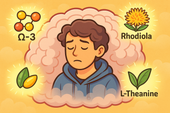
Brain Fog and Body Dysmorphic Disorder: Can Nootropic Supplements Help?
Brain fog often accompanies Body Dysmorphic Disorder, clouding focus and deepening emotional fatigue. Nootropic supplements like L-theanine, Rhodiola, and CoQ10 can help restore mental clarity, balance neurotransmitters, and bring calm energy back to the mind 🌿🧠.
-

How Stress Hormones Like Cortisol May Worsen Body Dysmorphic Disorder
Chronic stress floods the brain with cortisol — the hormone that keeps you on high alert. In Body Dysmorphic Disorder, this chemical overdrive fuels anxiety, distorts self-image, and traps the body in survival mode. Calming cortisol helps restore both peace and perspective 🌿🧠.
-

The Role of Neurotransmitters in BDD—and How Supplements May Help
Neurotransmitters like serotonin, dopamine, glutamate, and GABA shape how people with Body Dysmorphic Disorder perceive themselves. When these brain messengers fall out of balance, perception distorts — but targeted supplements can help restore calm, focus, and emotional regulation 🧠🌿.
-

What Is Body Dysmorphic Disorder? A Deeper Look at the Mind-Body Connection
Body Dysmorphic Disorder (BDD) isn’t just about appearance — it’s about perception. When brain chemistry, trauma, and stress distort self-image, the mind begins to see flaws that aren’t truly there. Healing starts by calming the nervous system and reconnecting mind and body 🪞🧠.
-

Keeping Calm in Competitive Sports: How to Train Your Mind, Body, and Chemistry for Peak Performance
Competitive pressure can overwhelm even the strongest athletes — but calm is trainable. By combining supplements like magnesium, L-theanine, and adaptogens with breathwork and mindset training, you can stay focused, balanced, and in control under any level of stress 🧠🏅.
-
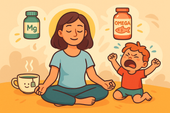
Supplements for Parents Facing Toddler Tantrums: Staying Calm When Little Emotions Run Wild
Toddler tantrums can drain even the most loving parent — but your calm is powerful. With the right supplements like magnesium, L-theanine, and ashwagandha supporting your nervous system, you can stay patient, grounded, and kind, even when emotions run high 🧸🌿.
-

Workplace Stress and Anger Management Support
Workplace stress can quickly turn into frustration — but calm is a skill you can train. By combining supplements like magnesium, L-theanine, and adaptogens with breathwork and mindset tools, you can stay focused, patient, and emotionally grounded no matter how intense the office gets 💼🌿.
-

How to Stay Patient With Family During Stressful Holidays
Holiday gatherings can stir up old stress and test your patience — but calm is possible. With nervous system support from magnesium, L-theanine, and adaptogens, plus mindful breathing and clear boundaries, you can stay centered, kind, and grounded even when family chaos unfolds 🎄💞.

















































